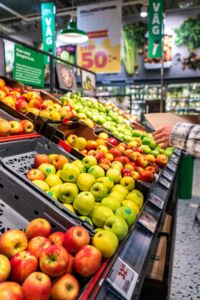News
Denmark for cocktails, Norway for cauliflowers: Topsy-turvy food prices prompting Swedes to head west
This article is more than 2 years old.
Some vegetables have nearly doubled in price, while butter and sugar have both increased by 50 percent

How do you like them apples (now they cost twice as much)? (photo: Philip Myrtrop)
The Swedes are well known for the way they consider Denmark as an off-licence, but mostly they’re not huge cross-border shoppers, like the Danes are with Germany, the Germans are with Poland, the Poles are with … etc.
But in recent months, prices have been going sky-high – at a faster rate than any of their neighbours – which explains why flocks of Swedes have been sighted crossing the border into Norway to fill their shopping bags, reports NRK.
Traditionally Norwegians would go shopping in Sweden, driven by their famously favourable exchange rate. However, food prices in Swedish supermarkets have risen by an average of 20 percent over the past year, urging shoppers to look for cheaper supplies elsewhere.
The main products Swedes buy are fruit and vegetables, but meat, bread, fish, cheese and butter are also cheaper in Norway.
Costly cauliflowers
While the 20 percent average increase in food prices could be defined as ‘steep but manageable’, the real problem Swedes are facing is the astronomical rise in the price of specific products.
Cauliflowers, for example, are 80 percent more expensive than they were a year ago. Butter and sugar are almost 50 percent more costly.
While Norway and Denmark share several supermarket chains, such as Rema 1000, Spar and Meny, Sweden has its own brands, and as such is possibly more susceptible to its own idiosyncratic fluctuations in price.
Bemused locals
This new trend has not gone unnoticed by Norwegians – particularly those who live close to their Swedish cousins.
The small town of Ørje, which lies about five kilometres from the border, has seen increased trade in its supermarkets.
“The Swedes buy everything from butter to Norwegian fish balls and fruit and vegetables,” said Anders Fjeldsted, the manager of Ørje’s Rema 1000.
Denmark suffers high prices
With a single crossing of the Øresund Bridge now costing 440 Danish kroner, it is unlikely the Swedes will be arriving in Denmark for their weekly shop anytime soon.
That said, food inflation has been high here as well, reaching an all-time high of just under 16 percent in August last year.
It has now fallen to around 15 percent, but food prices continue to skyrocket around the Nordic nations.










































